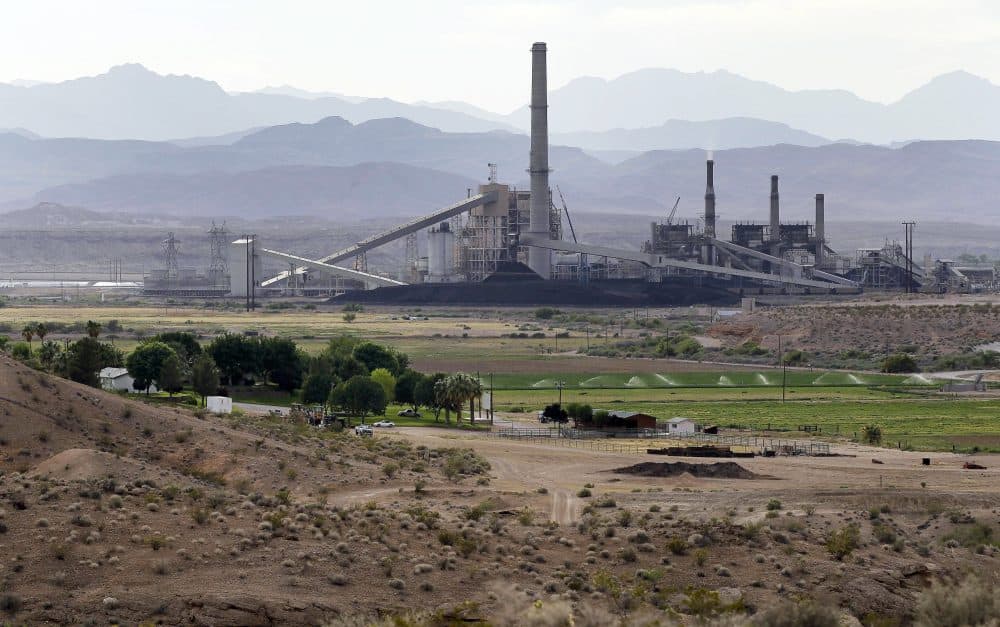Advertisement
COMMENTARY
Trump Abandons The Environment For An Illusion

With the signing of executive orders Tuesday, President Trump made clear his intention to scrap the centerpiece of President Obama’s climate change agenda, ostensibly to aid the moribund U.S. coal industry and create jobs.
Killing the Clean Power Plan, the set of Obama-era regulations that strictly limit greenhouse gas emissions from power plants, makes no sense. This is purely an ideologically motivated move that will benefit a tiny segment of the economy and hamper the nation’s efforts to fight climate change.
Numerous media reports have discredited the contention that easing restrictions on pollution from power plants will restore the coal industry to reasonable financial health. As a fuel for generation of electricity, coal is in tight competition with natural gas — each of the two generates about one-third of the nation’s electricity. But global trends strongly favor fracked natural gas, the production of which has sharply increased over the past few years.
Additional competition from renewable energy has made matters worse for the coal industry. In many areas of the country, solar and wind are now cheaper than coal, leading many utilities to embrace the new fuels and technologies. Since it's clear we need to reduce emissions, nobody is investing in new coal-fired plants. And as renewables gain ground, the consensus among economists is the elimination of regulations like the Clean Power Plan won’t be nearly enough to counter the prevailing market forces that have been driving coal companies out of business over the past several years.
But the number of regular folks who actually depend on coal money is puny -- there are only about 160,000 coal-related jobs in the country ...
The wholesale dismantling of Obama’s landmark regulations may play well in some coal-mining counties, but it's going to draw vocal opposition from many corners. Callers jammed the EPA’s switchboard when Administrator Scott Pruitt claimed last month that carbon dioxide isn’t a primary cause of global warming. And that response will seem muted compared to what killing the Clean Power Plan will evoke.
So the political upside for Trump in gutting the EPA appears limited outside of his core constituency. Polling consistently shows that people want the federal government to take action on climate change. A Gallup poll in March showed concern among Americans about climate change at its highest level in 30 years. The Trump administration should have learned from the health care embarrassment that taking away popular programs is politically fraught.
The real beneficiaries of killing the Clean Power Plan are the stockholders of Big Coal, who believe the plan exacerbates their financial plight. But the number of regular folks who actually depend on coal money is puny — there are only about 160,000 coal-related jobs in the country versus 374,000 in solar, according to a recent article in Forbes. And the wind power industry is burgeoning.
Advertisement
If we don't continue to aggressively reduce emissions, we increase the chances that we will realize the worst-case scenarios that climate models predict.
So it’s puzzling why such a small and shrinking sector of the energy economy draws so much attention, especially given its undisputed effects on people’s health.
An explanation can be found in Stephen Bannon’s ideological crusade for “deconstruction of the administrative state,” which is based on the notion that regulations, trade pacts and taxes have hamstrung the economy and must be eliminated in order for the nation to truly prosper. For Bannon, the Clean Power Plan is an ideal target — the apotheosis of an intrusive big-government hindrance to corporate autonomy and higher profits. His doctrine of economic nationalism casts the Paris climate accord, an important factor behind the development of the Clean Power Plan, as a pointless redistribution of wealth from the U.S. to developing countries. He sees killing the plan as another means to erase Obama’s legacy.
But politics aside, rolling back the Clean Power Plan is bad news for the global efforts to head off the worst effects of climate change. While it's evident that coal will never regain its dominance of the power sector, relaxing restrictions on emissions lowers the pressure to shut down existing coal-fired power plants in the near term. That means we’ll be walking when we should be running, with vigor, on a path of reduced carbon output. If we don't continue to aggressively reduce emissions, we increase the chances that we'll realize the worst-case scenarios that climate models predict.
The international community will suffer secondary effects. By effectively bailing on its obligation to fight climate change, the U.S. is making it acceptable for other nations to back away from their commitments. Regardless of whether the Trump administration formally withdraws the U.S. from the 2015 Paris climate accord, the damage is done, because the signal Trump is sending to the world is explicit. Through willful ignorance and dogmatic obstinacy, we have ceded global leadership on an issue of existential importance.
